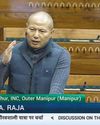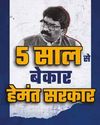
"THE FUNDAMENTAL NATURE of government is a platform," the tech billionaire Nandan Nilekani declared in the 2015 book Rebooting India: Realizing a Billion Aspirations, which he co-authored with the software engineer Viral Shah. "We are talking about radically reimagining government, its purpose, its role and the way it carries out its functions, with technology at its core." A campaign to realise this promise had been underway since 2009, in the form of the Aadhaar biometric identification system and the various digital systems that mushroomed around it. Nilekani and his coterie were now prescribing this approach to all domains of the state, from healthcare to education. The Indian state has since built countless platforms for identification, payments, healthcare, e-commerce-for government and private companies to use.
Aided by the Narendra Modi government, which aggressively portrays itself as an efficient technocracy and has harnessed technology to maximise its own power, such infrastructures are now in use on a massive scale. Indians use the COWIN platform to register for COVID-19 vaccinations, their Aadhaar details to open a bank account, the Unified Payments Interface to pay for groceries and a host of digital systems to access welfare schemes. The effect of this often forced digitalisation, we are told, has been a "digital revolution" that has resulted in vast improvement in the life of the average citizen.
This story is from the April 2023 edition of The Caravan.
Start your 7-day Magzter GOLD free trial to access thousands of curated premium stories, and 9,000+ magazines and newspapers.
Already a subscriber ? Sign In
This story is from the April 2023 edition of The Caravan.
Start your 7-day Magzter GOLD free trial to access thousands of curated premium stories, and 9,000+ magazines and newspapers.
Already a subscriber? Sign In

HOW TO SEE ART?
BN Goswamy's strategies of seeing

Bitter Crop
Ghana's cacao plantations in crisis

SURVEYORS OF DESTRUCTION
An atmosphere of fear persists in the wake of the Sambhal violence

SITE OF DECEIT
HOW THE ASI FORTIFIES HINDUTVA HISTORY

The Broken Pact
Minority legislators rue the erosion of the Constitution under the Modi government/

Hate by Proxy
How shadow accounts on Meta spread BJP propaganda in Jharkhand

Mob Mentality
How the Modi government fuels a dangerous vigilantism

RIP TIDES
Shahidul Alam’s exploration of Bangladeshi photography and activism

Trickle-down Effect
Nepal–India tensions have advanced from the diplomatic level to the public sphere

Editor's Pick
ON 23 SEPTEMBER 1950, the diplomat Ralph Bunche, seen here addressing the 1965 Selma to Montgomery March, was awarded the Nobel Peace Prize. The first black Nobel laureate, Bunche was awarded the prize for his efforts in ending the 1948 Arab–Israeli War.